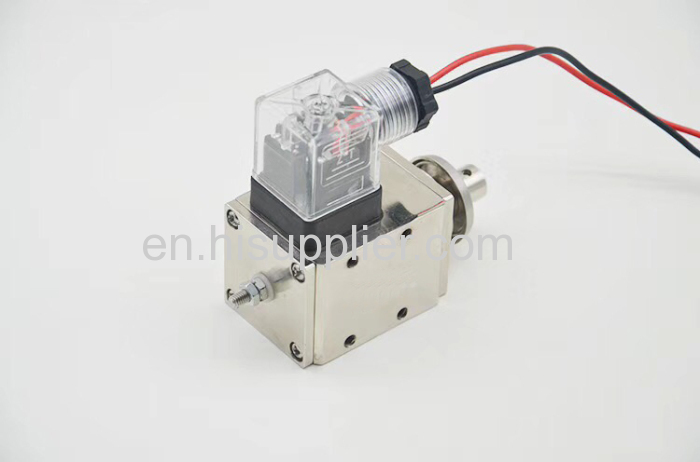


|
NINGBO HONY TECHNOLOGY CO.,LTD
|
| Payment Terms: | T/T,L/C,D/A,D/P,Paypal |
| Place of Origin: | Zhejiang, China (Mainland) |
|
|
|
| Add to My Favorites | |
| HiSupplier Escrow |
Hydraulic valve Water dispenser Solenoid Electromagnet
This wet electromagnetic coil,is applicable for single-phase bridge full-wave rectifying DC power supply control circuits, which voltage up to 220V.
Hydraulic valve Water dispenser Solenoid Electromagnet


Hydraulic valve Water dispenser Solenoid Electromagnet
Rated Voltage(V) | 12 24 110 220 |
Rated Force(N) | ≥37 |
Rated Stroke(mm) | 2.8 |
Total Stroke(mm) | ≥6.1 |
Power Consumption(W) | ≤30 |
Oil Pressure(MPa) | 19 |
Operating Frequency(T/h) | 12000 |
Wire Bag Inner Hole Diameter(mm) | φ23 |
Hydraulic valve Water dispenser Solenoid Electromagnet
Delivery
All available shipping ways could be applied, by courier, by air or by sea.
Appointed shipping company or our own forwarders all could be used in shipment.
Full-way tracking the cargos for you before the goods arrive.
Buyer's Guide
In order to quote you the best price quickly, please provide the following information:
1.Product size,grade,coating,etc.
2.Order quantity;
3.Attached the drawings if customized
4.Any special packing or other requirements
Our advantage
1. Fast reply: all your enquiry will be replied within 24 hours;
2. Reasonable price: we are direct manufacturer and able to offer better price;
3. Good quality: we are experienced in quality control;
4. Fast delivery time:7-20 days
FAQ:
1. What are neodymium magnets? Are they the same as "rare earth"?
Neodymium magnets are a member of the rare earth magnet family. They are called "rare earth" because neodymium is a member of the "rare earth" elements on the periodic table. Neodymium magnets are the strongest of the rare earth magnets and are the strongest permanent magnets in the world.
2. What are neodymium magnets made from and how are they made?
Neodymium magnets are actually composed of neodymium, iron and boron (they are also referred to as NIB or NdFeB magnets). The powdered mixture is pressed under great pressure into molds. The material is then sintered (heated under a vacuum), cooled, and then ground or sliced into the desired shape. Coatings are then applied if required. Finally, the blank magnets are magnetized by exposing them to a very powerful magnetic field in excess of 30 KOe.
3. How is the strength of a magnet measured?
Gaussmeters are used to measure the magnetic field density at the surface of the magnet. This is referred to as the surface field and is measured in Gauss (or Tesla). Pull Force Testers are used to test the holding force of a magnet that is in contact with a flat steel plate. Pull forces are measured in pounds (or kilograms).
4. What does the "N rating", or grade, of the neodymium magnets mean?
The grade, or "N rating" of the magnet refers to the Maximum Energy Product of the material that the magnet is made from. It refers to the maximum strength that the material can be magnetized to. The grade of neodymium magnets is generally measured in units millions of Gauss Oersted (MGOe). A magnet of grade N42 has a Maximum Energy Product of 42 MGOe. Generally speaking, the higher the grade, the stronger the magnet.
5. What is the difference between the different platings and coatings?
Choosing different coatings does not affect the magnetic strength or performance of the magnet, except for our Plastic and Rubber Coated Magnets. The preferred coating is dictated by preference or intended application. More detailed specifications can be found on our Specs page.
♦ Nickel is the most common choice for plating neodymium magnets. It is actually a triple plating of nickel-copper-
nickel. It has a shiny silver finish and has good resistance to corrosion in many applications. It is not waterproof.
♦ Black nickel has a shiny appearance in a charcoal or gunmetal color. A black dye is added to the final nickel plating
process of the triple plating of nickelcopperblack nickel.
NOTE: It does not appear completely black like epoxy coatings. It is also still shiny, much like plain nickel plated magnets.
♦ Zinc has a dull gray/bluish finish, that is more susceptible to corrosion than nickel. Zinc can leave a black residue on
hands and other items.
♦ Epoxy is basically a plastic coating that is more corrosion resistant as long as the coating is intact. It is easily scratched.
From our experience, it is the least durable of the available coatings.
♦ Gold plating is applied over the top of standard nickel plating. Gold plated magnets have the same characteristics as
nickel plated ones, but with a gold finish